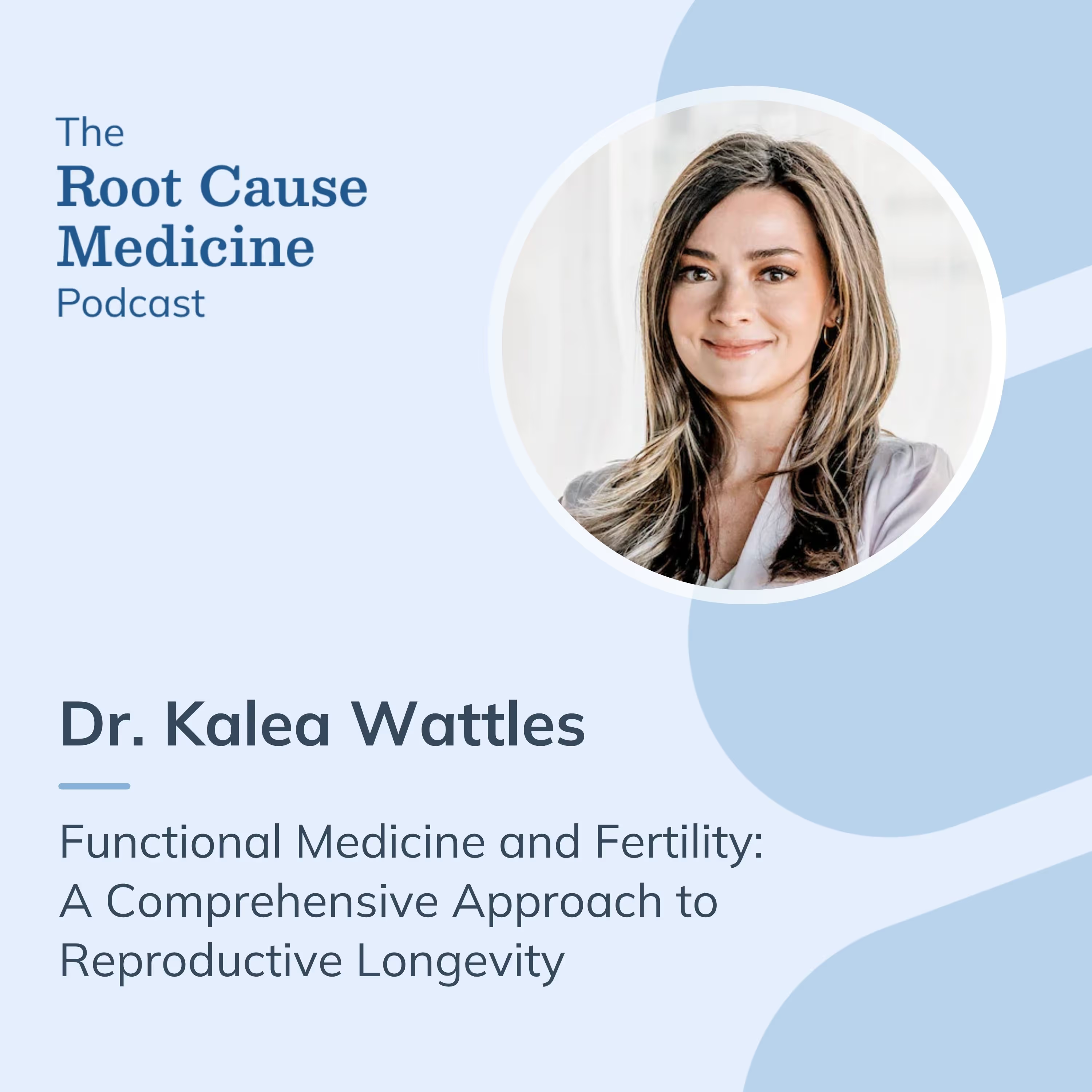
Pricing
Practitioners
Patients
Education
Pricing
Practitioners
Patients
Education



In this episode, Dr. Kalea Wattles explains all about reproductive longevity, including the fertility span, testing for fertility, and how to slow down ovarian aging.
Dr. Kalea Wattles, ND, IFMCP, is a naturopathic physician and functional medicine practitioner specializing in fertility. Currently serving as the associate director of curriculum at The Institute for Functional Medicine, where she has been on staff since 2017, she is committed to the advancement of the field through research and education.Dr. Wattles earned her doctorate in naturopathic medicine from Bastyr University, where she developed a keen interest in functional medicine. She went on to receive additional training from The Institute for Functional Medicine, where she further honed her skills in a root-cause, science-based, body-systems approach to health care.
Key Takeaways:
Focusing on reproductive longevity
It's a human-specific phenomenon to experience a decline in fertility potential around middle age. This could be attributed to the "grandmother hypothesis," where women lose their fertility at a young age to allocate time and energy to taking care of their offspring.
Nevertheless, losing reproductive potential has broader implications for various bodily systems, such as reduced bone mineral density and cognitive function, and an increased risk of cardiovascular disease. Therefore, it's essential to prioritize reproductive longevity to not only ensure successful pregnancies now, but also promote long-term health and vitality.
Understanding lifespan, healthspan, and fertility span
Lifespan is the total duration of a person's life, from birth to death. Healthspan, on the other hand, refers to the period of life during which an individual is in good health and free from chronic diseases or disabilities. It's a measure of function rather than a measure of time.
The fertility span is the period during which an individual is capable of reproducing, and it refers to the health of the ovaries, regular ovulation, hormone production that protects your bones and brain, and the nervous system.
Normal versus pathological ovarian aging
Women's ovaries naturally age, leading to a decline in function that culminates in the menopausal transition, usually occurring in the early fifties. This process is a normal part of aging and occurs regardless of a woman's overall health.
However, some women experience an acceleration in ovarian aging, resulting in a decrease in ovarian reserve, which can lead to infertility. This can occur even if the woman is still having menstrual cycles and normal hormone levels.
Premature ovarian insufficiency is another condition in which the ovaries exhibit perimenopausal or menopausal symptoms, such as irregular periods, even in younger women.
Oxidative stress and inflammation
Oxidative stress and inflammation are the two biggest contributors to ovarian aging. Oxidative stress is when the body experiences a buildup of compounds that can damage DNA. It can be from having a high sugar diet, environmental toxin exposures, chronic inflammation, or a low intake of dietary antioxidants.
Inflammation can come from lots of different sources. Periodontal disease is a significant contributor to inflammation in the reproductive system. But it can also come from food sensitivities, intestinal hyperpermeability, or leaky gut.
It's crucial to acknowledge the interconnectivity of all the systems in our body, as each one can impact the others. Therefore, when a woman intends to get pregnant, she must ensure that all her bodily systems are in proper working order and balance.
Slowing ovarian aging
Be mindful of your diet and reduce sources of advanced glycation. This means cutting back on fried and baked foods and focusing on consuming more antioxidant-rich foods. In addition to dietary changes, it's also important to consider lifestyle factors such as exercise, stress management, and adequate sleep. Also, regularly test.
Also, check out Dr. Kalea's recommended lab testing: Hormones testing, Luteinizing hormone test, Follicle-stimulating hormone test, Testosterone panel, DHEA-S Test, Progesterone testing, Thyroid testing, TSH testing, Free T3 test, Free T4 test, Reverse T3 test, Thyroid antibodies test, Comprehensive metabolic panel, Lipid panel, High-sensitivity C-reactive protein test, Hemoglobin A1C test, Fasting insulin test, Nutritional testing, Vitamin D testing, B vitamins testing, Celiac panel, Ferritin test, Iron test, Homocysteine test, Infectious screening, HIV test, Syphilis test, Chlamydia test, Gonorrhea test, Hepatitis test, Cytomegalovirus test, EBV test, Salivary cortisol test, Comprehensive stool analysis, Micronutrient testing
Learn more about IFM:
Pathways to Well-Being (IFM Podcast): https://info.ifm.org/podcasts
IFM LinkedIn: https://www.linkedin.com/company/institute-for-functional-medicine
IFM Twitter: https://twitter.com/fxmed
IFM Facebook: https://www.facebook.com/instituteforfunctionalmedicine/
IFM Instagram: https://www.instagram.com/instituteforfxmed/
IFM Website: https://www.ifm.org/
If you enjoyed this episode then please either:
Previous guests include: Dr Cheryl Burdette of Dunwoody Labs, Cynthia Thurlow of Everyday Wellness, Dr. Stephanie Estima of Hello Betty, Keri Anania of Nebraska Functional Medicine, Dr. Ralph Esposito of Athletic Greens, Dr. Rob Silverman of Westchester Integrative Health Center, Dr. Elizabeth Yurth of Boulder Longevity Institute and Dr. Mindy Pelz of Dr. Mindy Pelz Co.
Check out our three most downloaded episodes: